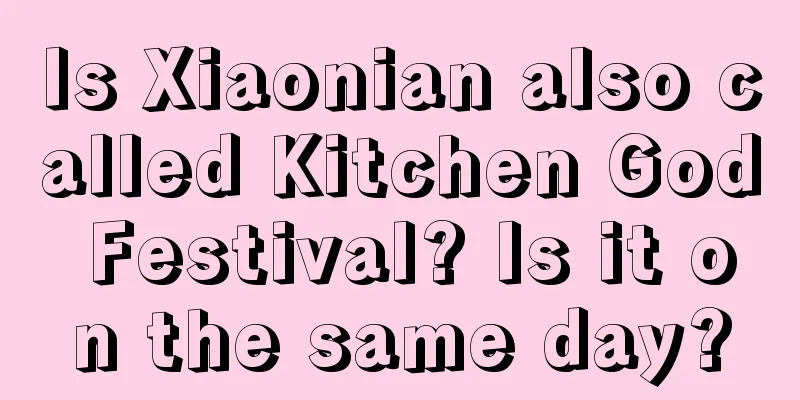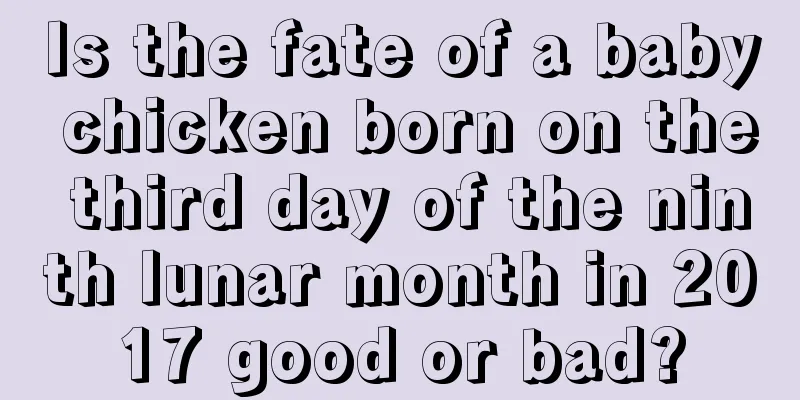Is Xiaonian also called Kitchen God Festival? Is it on the same day?

As we all know, Xiaonian is one of China's traditional festivals, and China's traditional festivals have many nicknames. So is Xiaonian also called Kitchen God Festival? Is it on the same day? The Fortune Teller website has carefully prepared relevant topics for the 2018 Chinese New Year and New Year’s Eve. Everything you want to know is included. Come and have a look!Is Xiaonian also called Kitchen God Festival? Is it on the same day?Xiaonian is also known as the Kitchen God Festival, so it is on the same day;Kitchen God Festival <br /> Kitchen God Festival has a long history in Chinese folklore and is a traditional festival of the Han nationality. It is also known as Little New Year, Thanksgiving, and Kitchen God Festival. The tradition of worshiping the Kitchen God is commonly known as "sending off the gods" in Chinese folk beliefs, and is called "Gowankai" in the Ryukyuan language. Firecrackers are set off on the night of Little New Year (the 23rd day of the 12th lunar month). It is said that at the end of each year, the Kitchen God, Tai Sui God and other folk gods would return to heaven to report to the Jade Emperor. In particular, the Kitchen God would report to the Jade Emperor about the good and evil in the world as a basis for rewarding or punishing humans. Therefore, most people worship the gods and the Kitchen God at home at this time. The 23rd day of the twelfth lunar month is also regarded as the beginning of the Chinese New Year. In ancient times, the Kitchen God Festival was second only to the Mid-Autumn Festival in status. In ancient times, those who were officials, businessmen or students away from home would rush home before the Kitchen God Day to reunite with their families and eat homemade candies in order to pray for blessings from the Kitchen God and peace for the whole family in the coming year. Xiaonian <br /> Xiaonian does not refer to a specific festival. Due to local customs, the festivals called Xiaonian are also different. The main folk activities during the Little New Year include pasting Spring Festival couplets, sweeping the house, and offering sacrifices to the kitchen god. The concept and date of Xiaonian vary from place to place. It is the 23rd day of the twelfth lunar month in the north and the 24th day of the twelfth lunar month in the south. In Jiangsu, Zhejiang and Shanghai, both "the 24th day of the twelfth lunar month" and "the night before New Year's Eve" are called Xiaonian. In Nanjing, the Lantern Festival on the 15th day of the first lunar month is called Xiaonian. In parts of Yunnan, it is the 16th day of the first lunar month, and in some ethnic minority areas in the southwest and north it is New Year's Eve. The Little New Year also means that people begin to prepare New Year's goods and get ready to have a good new year in a clean manner. It means that the new year will have a new look and expresses the Chinese working people's good wishes to bid farewell to the old and usher in the new, and to welcome good luck and fortune. |
<<: Is the 27th day of the 12th lunar month in 2017 an auspicious day?
>>: Where is the lucky god for the 2018 Little New Year? What does the God of Joy think?
Recommend
Is the tenth day of the Lunar New Year in 2017 a suitable time to get engaged? How about getting engaged on the tenth day of the first lunar month?
Introduction: Engagement is as important as marria...
Is October 29th of the lunar calendar in 2019 an auspicious day? Can I burn incense and pray for blessings?
The cold wind blows south in the tenth month of th...
What day is September 15th in the lunar calendar 2018? Solar term Frost Descent?
Introduction: The specific date of the solar term ...
Can we worship our ancestors on the first day of the eleventh lunar month in 2021? Is it okay to worship our ancestors on that day?
There are certain rules and considerations for cho...
What will be the fate of a dog baby born on April 17th of the lunar calendar in 2018?
Introduction: Summer is coming, and the air around...
2020 Year of the Rat Lunar October 28th Lunar Calendar Lunar October 28th ...
What are the good days and bad days in the tenth ...
What should be done and what should be avoided on the 26th day of the seventh lunar month in 2020?
What should be done and what should be avoided on...
Is it a good idea to move house on March 3rd, 2018? What should I pay attention to when moving?
Introduction: March 3rd is an important festival, ...
Is May 16th of the lunar calendar in 2021 a good day? Is it suitable for praying?
The feet are steaming with the hot earth air, and ...
Is today, the first day of the fourth lunar month in 2019, a suitable day for worshiping ancestors?
Introduction: Ancestor worship is also a very impo...
Can I get a haircut on February 28th of the lunar calendar in 2018?
Introduction: Haircut can improve your image and m...
What is the zodiac sign for the fifth day of the sixth lunar month in 2018?
The constellation representing the fifth day of th...
Is April 11th of the lunar calendar 2021 an auspicious day? Can I move house on the same day?
Moving also requires choosing a good and appropria...
Check the almanac for the second day of the twelfth lunar month in 2017. Is it a good day?
The twelfth month of the lunar calendar is also k...
Is it a good idea to get married on the fourth day of the eleventh lunar month in 2017, or to get engaged and get a marriage certificate?
Winter months are cold, but when everything goes ...









